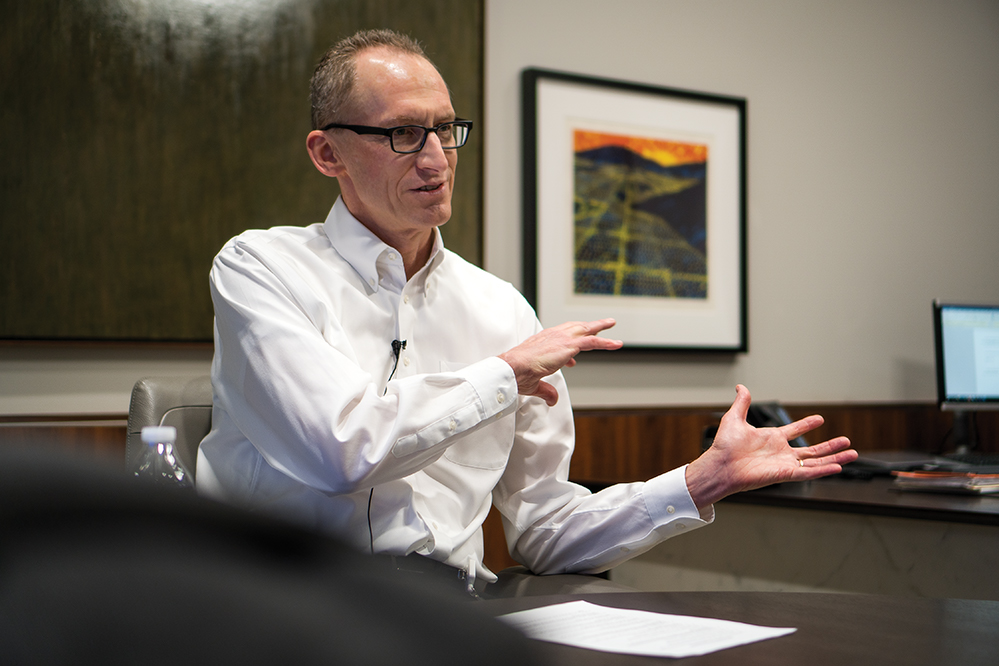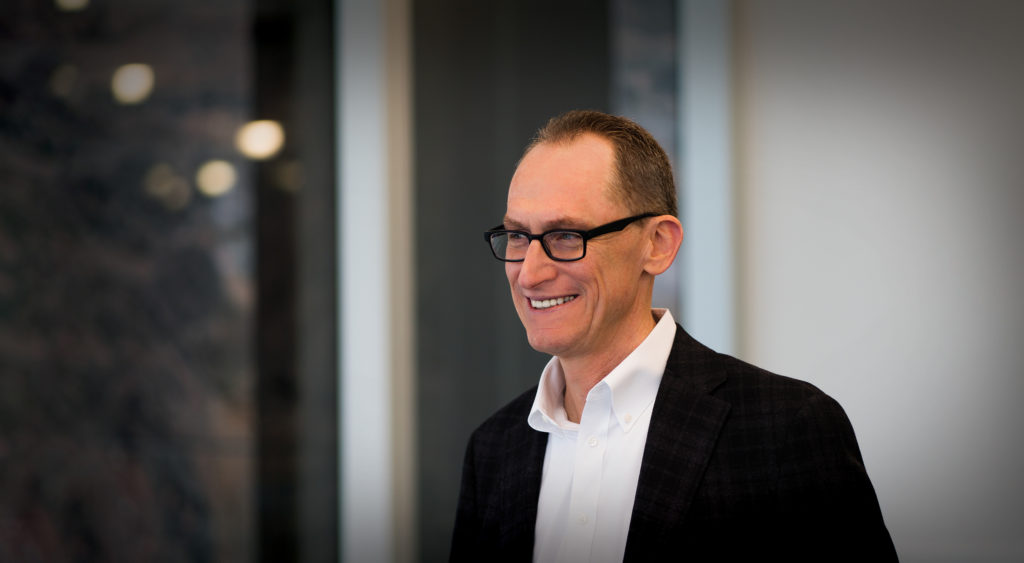
Gary Scholten
Gary Scholten is the Executive Vice President, Chief Information Officer and Chief Digital Officer at Principal. He has served on the Board of Directors for TAI for the past 13 years. Throughout his nearly 40-year career at Principal, he’s been a champion for diversity and inclusion. He says assembling teams with a wide variety of experiences, perspectives and backgrounds yields better answers and breakthrough innovation, and enables the company to address changing customer expectations and business needs head-on.
Can you tell me a little bit about your career path and what led you to your current role as executive vice president, chief information officer and chief digital officer at Principal?
I’ve been with Principal almost 40 years. I came straight out of college, and I’ve had the opportunity to work in almost every single one of our business units over my career. I’ve always had at least one foot in technology, including multiple roles that had something outside of traditional technology. Then, in 2002, I was named global CIO. I’m also responsible for driving digital strategy throughout our businesses. The fact that I had experience in all of our businesses was a huge benefit, because I knew the people and businesses prior to being in an enterprise role. In my years at Principal I’ve overseen corporate strategy and human resources, and I helped form an offshore company and chaired that company for 13 years.
Growing up, did you always have a passion for technology?
I grew up loving math and come from a family who loves math. I knew I wanted to pursue it, but I wasn’t sure how to use it going forward. I chose UNI for college because at the time the computer science curriculum was housed within the math department. It was sort of an opportunity to pursue math and explore technology. Throughout college, I was fortunate enough to get an internship with a subsidiary of NASA, where I did technology work for a summer, and I got a part-time job doing software development for John Deere in Waterloo.
How do you encourage growth and innovation at Principal?
It’s core to what we do, because our customer expectations are changing very quickly. As a consequence, our businesses are changing, and we have to continue to innovate to keep pace. Part of my role as chief digital officer is to challenge our business strategies and ask, “How could we leverage digital strategies and technology in different ways?” That really ties into another role that I’ve had the opportunity to play as chair of our Diversity and Inclusion Council for the last seven years. Diversity of thought is very critical to innovation.
If you only have people with the same background who think about things the same way, you’re not going to have breakthrough innovation. But when you have people who think about things differently, that’s where innovation comes from. If you combine employees, business leaders, technologists, and data specialists, all stemming from different backgrounds, that’s where the magic happens.

Diversity of thought is very critical to innovation.
In the last seven years of leading the Diversity and Inclusion Council, what would you say has been Principal’s biggest advancement in that area? How has the company evolved?
It continues to evolve. Inclusion is not a destination; it’s a journey. And you have to continue to adapt. We really focused early on making sure it’s an inclusive environment. We have employee resource groups where people of different backgrounds celebrate and talk about their experiences. So, we did a lot to support them. I’m proud to say that in the last five years people who come from a diverse background have more positive employee opinion survey scores than people who have come from more common backgrounds. That to me is just one sign that we’re making some progress, but it’s a continuous improvement kind of environment.
In 2016, you were recognized as the Iowa STEM Champion by the Iowa Governor’s Science, Technology, Engineering, and Mathematics (STEM) Advisory Council. How have you fulfilled that role by bringing STEM initiatives to Iowa?
On the council, I bring the business perspective. It’s important to bring all perspectives, and we have other industries such as teachers and government officials. But one of the things I’m most proud of is growing our workforce, and creating opportunities for kids coming through our school. Many of our advancements have happened because we’ve had business step up to the plate to play a key role. Early on, that was through the Technology Association of Iowa (TAI) and the Hyperstream program. Throughout the years, business participation is what has driven some of our STEM progress in Iowa, and that was one of my roles on the committee.
What are you passionate about outside of Principal?
If you want to see what somebody is really passionate about, go see who they follow on social media. I enjoy music, especially jazz. I also enjoy politics — not as part of any political party, but more the process, in particular workforce-related issues at the state level. I like to try to affect legislation as opposed to just being a part of campaigns. Finally, I grew up in a baseball family, but I actually like basketball and football a little bit more, as well as soccer.
Who has influenced you in your career?
I’ve had many mentors over the years. Certainly there are people within Principal who have helped me along the way. I feel with leadership roles, but especially technology leadership roles, it’s impossible to do it by yourself. I can’t look at anything over my career and say that was successful because I did it by myself. The person who I considered the first CIO at Principal is someone I learned a great deal from, both in terms of his leadership and how to stay current on technology.
I’d say a lot of my learnings have come from people lower in the organization than me. We had a group of people, for example, that came to me several years ago and made a proposal to a committee that I chair to do internal hackathons, and explained the benefits of it. This group stayed together and I’ve tried to stay connected with them because they approach digital initiatives with a native perspective.
What advice would you give to a young student or anyone in an entry-level tech position?
Keep your options open and work toward those. To that point, especially if you are still a student, take as much math as you can, and are interested in. It creates more opportunities. You can have a great career in technology without having a deep math background, but it helps. There are lots of growing areas: Certainly software engineering. So, getting some experience with that as early as you can is good, and being involved in hackathons when you get to that point is a way to learn intensely in a short period of time. Also, things related to data — work on databases, use statistics if you can. And there are great opportunities in information security. If you know about those areas, it just opens up more opportunities.
Don’t let others define what career success is for you. You’re the only one who can define that. I’ve seen people pursue things they weren’t passionate about, or weren’t interested in, because somebody told them that was what they should do to be successful. You can be successful in whatever avenue you choose. Just don’t let others set the success criteria for you.
Don’t let others define what career success is for you.
This year’s Catalysts series focuses on underrepresented groups in technology. How do you attract people from different backgrounds in tech?
Role models help a great deal. One of the advantages that Principal has had is, counter to what’s happening across industries where only 18 percent of young technology professionals are women, 43 percent of technology professionals at Principal are women. Out of five vice-president level technology leaders at Principal, three are women. So, we have great role models. As we bring interns or entry-level technologists into the organization who are women, they can see people who have been very successful here, and that role model is a really important piece of it. That’s one of the things we do.
We’ve been doing national recruiting for about seven or eight years now, and have been really successful with that, including with traditionally black colleges and universities and others. We can get more people with more diverse backgrounds into our internship program, which is an important feeder into our permanent employee situations. As part of the internship program, we do lots of activities so the interns get to interact a fair amount. For example, we do an intern hackathon (we call it Code Jam internally) where you take teams of people that haven’t worked together before, give them hard problems, and they have three days to try to solve them. With those sorts of things, every person has to be a part of it. I think everybody can see the value of, “I come from this university and we study this way,” or “I’m from this community and we have this perspective.” And they get a better answer as a result.
You’ve been on the TAI Board since 2006. Why did you choose to invest your time in TAI? What makes the organization important to you?
Years ago, two people from TAI came and met with me and said, “Technology is much broader than just the companies that consider themselves tech companies. We’d like to grow beyond that, and we think we can have more influence and more value for our membership if we do that. As the largest employer of technology professionals in the state, we think it’s important for Principal to be a part of it.” They hadn’t even finished their pitch and I agreed to do it, because I saw the value in it.
One of my goals before I retire is that I want Iowa to be known as a technology state. Some of that is just to emphasize, “Think big.” But some of it is really that I see potential here. Financial services is heavily represented in insurance — about 20 percent of most financial services companies are made up of technology professionals. Advanced manufacturing is also big. We have that base of a lot of tech workers already, we just needed a group to provide a common purpose. TAI helped set that common purpose for our businesses to rally around. The success of TAI demonstrates that we were right to be a technology state.
How can we continue to build that tech community statewide initiative and further that reputation?
The Iowa Technology Summit is a good example of that, where common interests are brought together. Principal can do that because of our size, but most businesses don’t necessarily have that ability to interact with other technologists and technology leaders in the state. Prometheus Awards and recognitions are important to be able to put a spotlight on the huge successes that we’re having with technology here in Iowa.
In regards to your global travel and outreach, what have you found most interesting about the people in technology outside of the United States?
I’ve observed more about the commonalities. People are interested in the same things and get excited about the same things. I’ve talked to technologists in India and Chile, and most people get into it because they like change. If you don’t like change, technology is probably not the field for you, because it continues to change all the time. People all over the world want to know about emerging technologies. That’s a common thing, something that we try to bring together.
For differences, many people come from differing backgrounds. With our Indian operation, which I’ve worked with closely now for 13 years, one of the real advantages is the diversity it brings in — not just the fact that employees grew up in India or were educated in India, though certainly there are advantages to that, but that about 900 technology employees in Pune came from probably 500 different organizations. They bring experience from other companies to the table, and a difference of thought is really, really valuable to us. I’d say different backgrounds, different experiences are a real advantage.
As you look back on your time, what are you most proud of?
I think just the accomplishments of people I’ve been able to work with, that’s probably what I’m most proud about. I’ve seen some people who early on I maybe underestimated what they could do, and they’ve risen far beyond what I thought was possible. That’s so gratifying to see. Within Principal, our external reputation, related to how we use technology, preceded my becoming CIO, and I’m very confident that reputation will remain long after I’m no longer CIO. Just Principal’s willingness to take risks on technology is something I’m really proud of.
I even think about TAI. I had high aspirations that day when they came and asked me to be a part of it, and where TAI has gotten is well beyond what I could have imagined. I always think I’m kind of a dreamer and think big, but the impact it’s had on the state is even bigger than I expected.

I hope the impact I have is left with the individuals I’ve interacted with. No successes that I’ve been involved in have been things that I’ve done individually.

